We walk a half-hour through rain, wet from shoes to hair. I do not
care. We find the building off the Avenue de l’Opéra. In the foyer
are milling young—a few Adonises and nymphs.
A bulletin board: Mythologie Conférence, Rez-de-chausée, Salle
zéro[1]. We climb a flight of stairs, pass a mural of vigorous
muscular youths circa the ‘20s, doing calisthenics for the state.
We peek in a room, see dancers at the barre.

Richard darts into the bathroom.
I peek again. A miffed French woman with slicked back hair appears: “Nous
n’avons pas fini cette classe![2]”
Richard returns. We go up. We ask a woman if she knows the way
to the myth room. Down below, she thinks.
We go down to the basement. A Zen teacher smiles peace into us,
but Richard cannot feel it. He feels lost.
Up we go again. Wrong room.
Down we go to the main floor. I open a door that leads outside. Richard
snaps his fingers at me, as if I were a dog. I know it’s just stress. I follow him
into a small dark room with a mirror covering one wall. An empty dance
space.
A small Asian man enters. A tall heron of a teacher bustles in,
turns on the lights, sets up a slide projector and arranges notes on a
desk. One by one, men enter. One looks like an accountant in a
short-sleeved shirt. Another is pudgy, shifty. There’s a young,
sleepy Frenchman.
We unstack the folding chairs, Richard and I at the back. Am I the only
woman in Paris who loves myth?
The lecture begins. Slides on the screen. Hermes has wings on his
hat, his caduceus, his shoes. He is “légèreté de l'être, rapidité,
l'échange d'énergie, mais pas commercial, non! L'échange
d'énergie spirituel, comme dans les secrètes d’Égypte[3],” or
something like that.

This teacher understands the essence of these êtres divins[4]. Here is
Zeus, king of the gods, bearded, powerful, gripping his
thunderbolt. As Monsieur speaks of Zeus, the rumbling overhead
gathers in volume—a stamping of feet in a ballet class, or the
god’s thunder? A back window blows open behind us. One man
moves to close it. It opens again. Another man closes it harder. It
opens to the rain and noise of the sky and the street. Another man
closes it. It opens again. Zeus will not be shut out. We surrender.

Here is Athéna, snake-haired Medusa on her shield. Perseus cut off
her head, freeing Pegasus, the winged horse of poetry. Athéna has
a creature on her helmet, resting on its haunches. Is it a lion? A
sphinx?
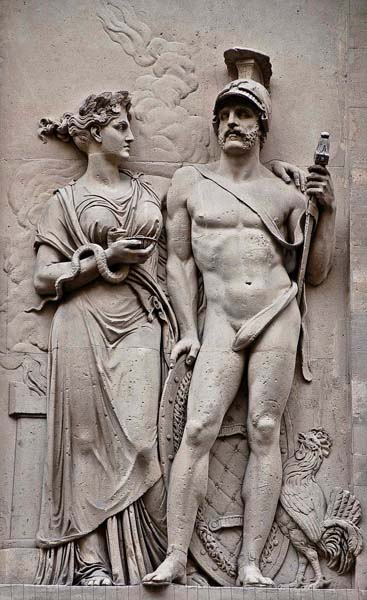 Athena and Ares
Athena and Ares
And here is Hephaestus, the ugly god. His mother, Hera, dropped
him from Olympus, and he limps, ankles broken. He is heavy,
lourd, and he works with heavy things, iron, making weapons, also
jewelry for the goddesses, lovely things for his wife, Aphrodite.
Look at Aphrodite! In this painting I’ve never seen, she is all milky
skin with pink blush, up on clouds like swans, and swans are riding
the clouds.
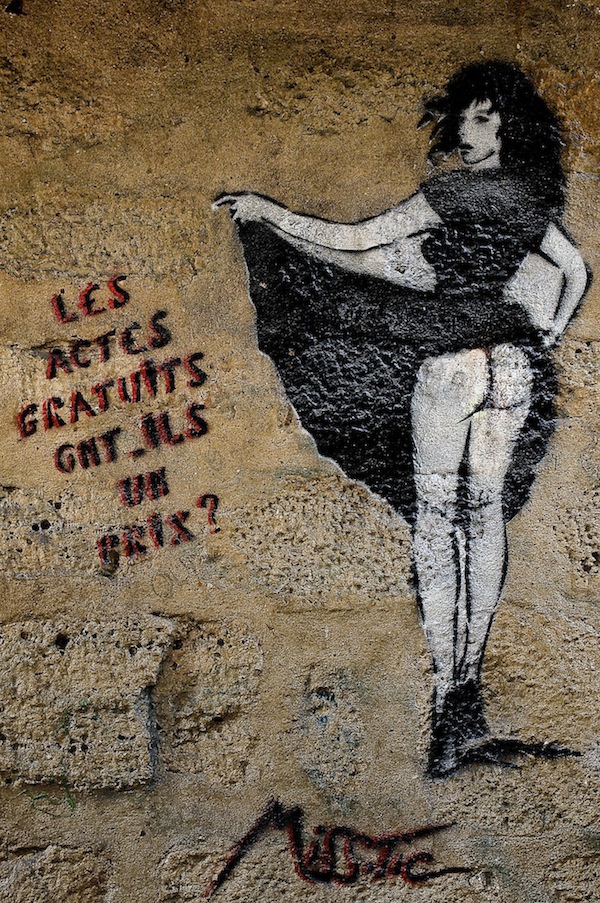
Her lover is Ares, god of action, of muscular body and war.
(I think of him as the god of Italy, its shape a boot for walking,
exploring, and hunting booty.)
Apollo is here in a painting with Daphne, who chose to become a
laurel tree, rather than sleep with him. A laurel wreath is now the
crown of achievement. He is inner beauty, says Monsieur. (But
I thought he was more a communal god of music and harmony.)
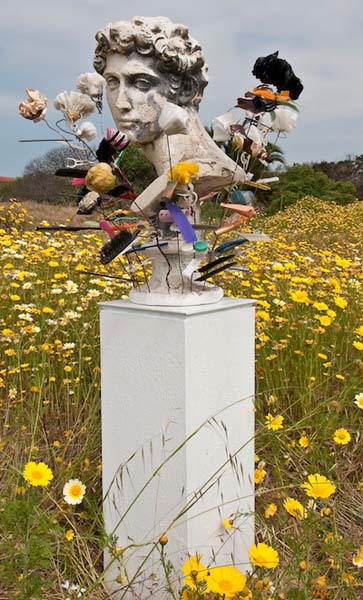
And here is Artemis, goddess of the hunt. Of the purity of nature.
Of cleanliness and chastity. When Actaeon happened upon her as
she was bathing, she turned him into a stag, and his own hounds
tore him apart.
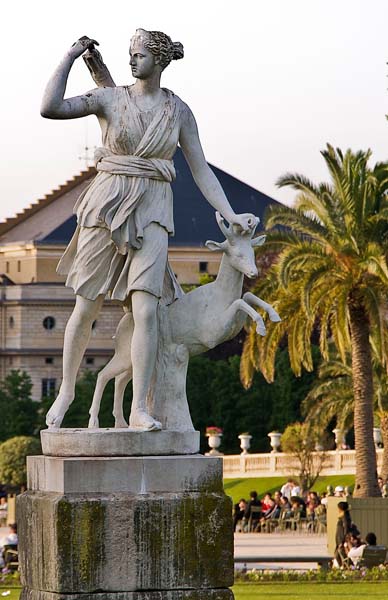
And here is another painting I’ve never seen, of Hestia—ample-
bodied, in long dress, leaning against an altar holding a flame.
I am thrilled to hear his subtle understanding of this family I know
so well. Thrilled that I can understand much of what he’s saying.
Now he takes questions. First to wave his hand is the pudgy man
who’s been sneaking peeks at himself in the ballet mirror
the whole lecture. He asks a meandering question
about Aphrodite (of course!): “Elle, elle Aphrodite ... la bataille
entre le feu et l'eau .. la guerre à l'intérieur de nous ... les cygnes
la suite de son ... Zeus un cygne, un cygne ... Ares ai eue aussi, un
combat intérieur de ma tête,”[5] and who knows what else.
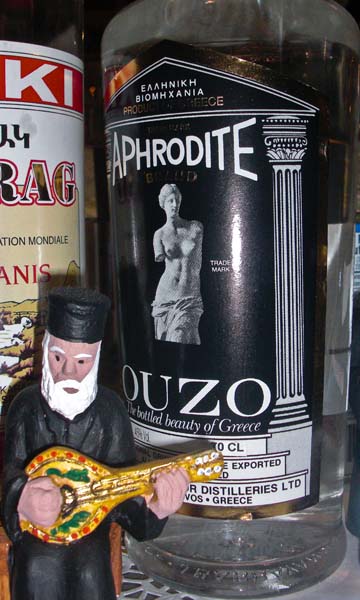
It’s painful listening to this question that never ends. The lecturer
grows tense and so do we. He tries to answer the man and move on.
I’m the last to ask. I agree with him, I say, on Hermes being about
spiritual exchange, rather than, as many say, commercial.
He suggests I ask the question in English. He’ll translate for the
class. Dang, I was so happy to understand, but I still can’t
voice what I mean. I ask him later about the bag Hermes
carries.
“Is it the sac[6] d’un égrue?” He looks confused.
“C’est un oiseau de l’eau[7],” I say. He doesn’t understand.
“Oh! Je veux dire, grue.[8]”
“Crane! Oh!” He gets it. But he doesn’t know.
We talk about the next lecture.
“It’s next Monday,” he says.
“Bon!”
But I forgot to ask, What was the animal on Athene’s head?
Who did the painting of Hestia? Who did the glorious Aphrodite
with white swan clouds?
The Invisibles take many forms in the imaginations of visionaries and artists
of every country, every time in history. The characters and shapes
of the goddesses and gods envisioned by the ancient Greeks have endured
over many centuries and miles. They still speak to us here today in Paris.
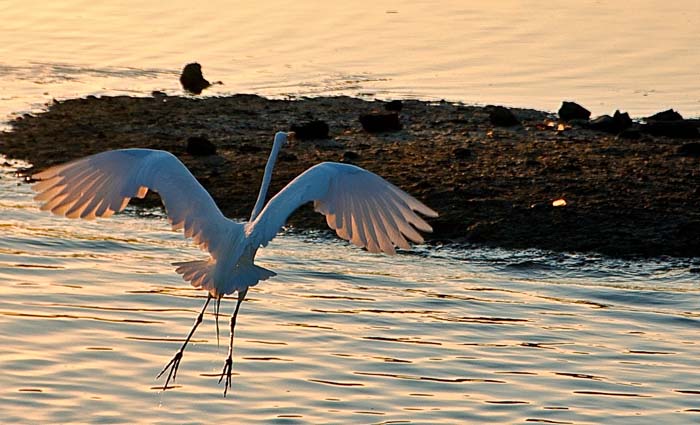 Hermes as Crane
Hermes as Crane
[1] “Mythology Conference, Ground Floor, Room Zero.”
[2] “We have not finished this class!”
[3] “lightness of Being, speed, energy exchange, but not commercial, no! The exchange of spiritual energy, as in the secrets of Egypt.”
[4] “divine beings”
[5] “She, she Aphrodite … the battle between fire and water… the war inside us…the swans following her… Zeus a swan, a swan… Ares got her too, fighting a battle inside my head,”
[6] “bag”
[7] “It’s a bird of the water.”
[8] “I mean, crane.”